Karen Gerth, who founded Keystone Pet Enhanced Therapy Services (KPETS) in 2003, is of the opinion that “we’ve only touched the tip of the iceberg” in discovering how canines can help humans from social, psychological, physical, educational and medical standpoints. The most recent accomplishment on the part of canines is undergoing training to “sniff out” the coronavirus.
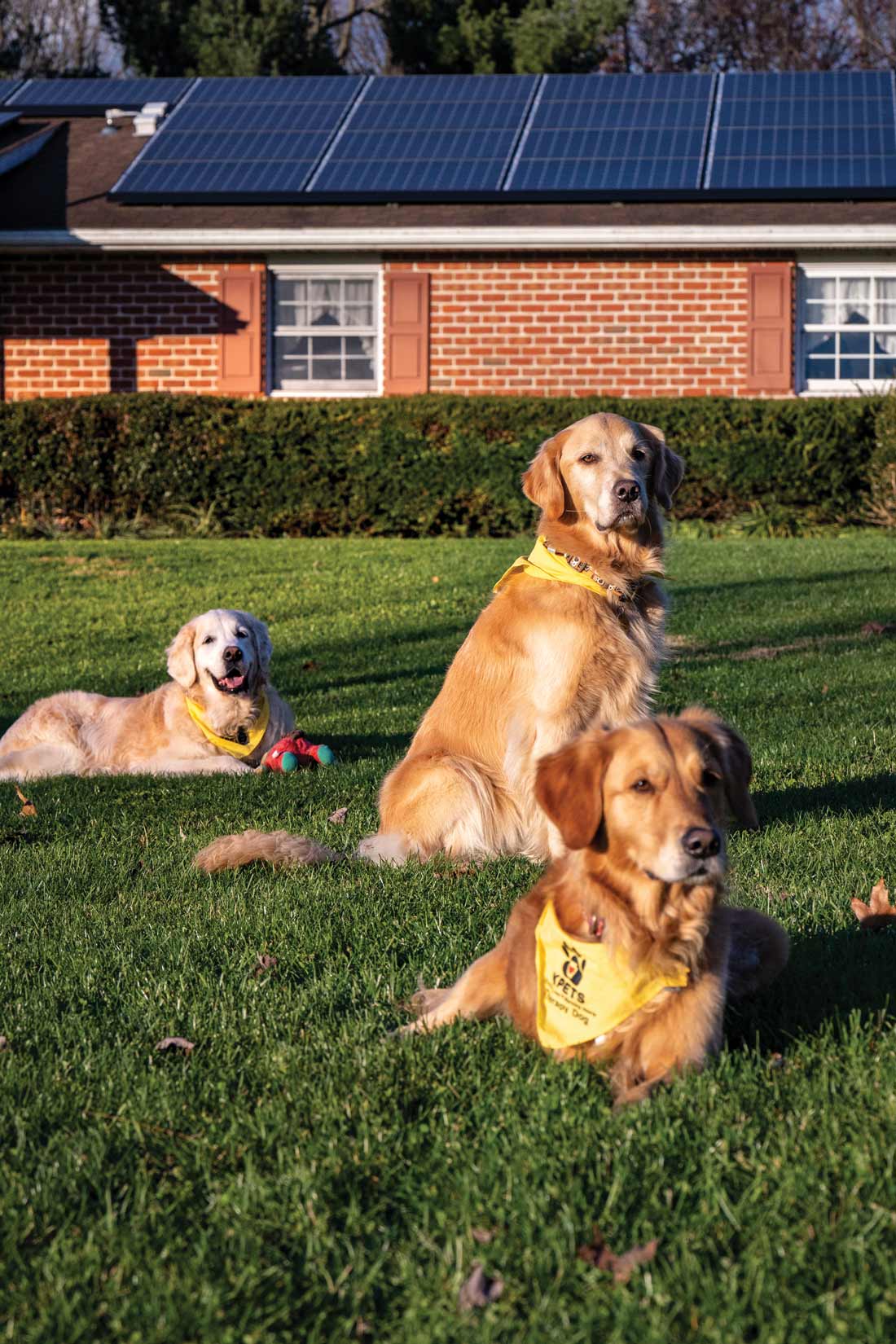
Zeke, Kody and Kylee enjoy a sun-filled November afternoon at their home in Akron. The threesome are the stars of Karen Gerth’s social media postings on Facebook and Instagram that she calls “Karen and The Kids.”
Karen, who grew up in the Ephrata area, has always loved animals, notably dogs and specifically golden retrievers. “Somebody warned me that once you have a golden, nothing else will ever do,” she says. Karen and her husband, Bill, discovered that to be absolutely true and have welcomed a succession of goldens into their home, including two tripods, the most recent of which is 6-year-old Kylee. “We adopted her through the Delaware Valley Golden Retriever Rescue,” she says of the velcro dog she describes as being “a great snuggler.” As for the breed, Karen relates, “They’re just easy dogs to love and live with. They are very people-oriented and love to please.” In addition to Kylee, Karen’s pack also includes her walking buddy, 7-year-old Kody, and Zeke, who is 11.
Whether it’s a pedigreed purebred or a multi-breed mutt, their humans probably feel the same way about them. In responding to the question, “What is it about dogs?,” Karen provides a list of their attributes. “They’re just so nonjudgmental and they are always glad to see you, whether you’ve been gone five minutes or five hours,” she says. “They’re also a lot of fun – my dogs make me laugh and can turn a bad day into a good one. Dogs make you slow down and smell the roses; they connect you to the natural world – Kody and I walk on the Warwick to Ephrata Rail-Trail nearly every day. Dogs also help us connect to other people – because of Kody, I get to talk to so many people on the trail.”
From IT to KPETS
Despite her connection to animals, Karen’s career path initially took her in a completely opposite direction: Information Technology (IT). “I enjoyed my work but it wasn’t something I could say I was passionate about,” she explains. Additionally, she was searching for a way to “give back to the community.”
She decided she could do the latter by becoming a “puppy raiser” for an organization that trains service and assistance dogs. She soon realized she would have to find another avenue of community service. Cinda, the puppy Karen was raising, failed to meet the requirements to proceed in the program and was ultimately adopted by her. “She was our first golden. It would have been difficult to give her up; I can’t imagine,” Karen says of being a puppy raiser. “It’s hard not to get emotionally attached. I admire people who can do it. It just wasn’t for me.”
She soon became aware of organizations that work with human/canine teams to dispense comfort, support and affection to people who may be feeling lonely, defeated or depressed. Such work takes the teams into retirement communities, hospitals, rehabilitation centers, hospices, schools, libraries and juvenile detention facilities. With her happy-go-lucky goldens to partner with, Karen saw canine therapy as her way to serve the community. “I registered through a national organization, underwent the training and got to work,” she recalls.
Other dog owners became interested in what was then a rather novel idea for the Lancaster area. That led Karen to follow her church pastor’s message of finding your vision and acting upon it. She ultimately developed her own program and initially partnered with dog-loving friends who also attended The Worship Center to offer their services to the community. The name of the group was 3CPO (Caring Christians and Canine Pet Organization). Again, word spread and 3CPO was overcome by requests from dog owners, as well as community groups and facilities that could benefit from the services they offered.
“We just couldn’t keep up with the interest that was coming our way,” Karen recalls. She credits the level of interest to the fact that “people who love their dogs are always looking for things to do with them to keep them stimulated. The athletic stuff isn’t for everyone,” she says of agility, lure coursing, dock-diving and other dogsports.
Karen began researching the possibility of becoming a 501-(c)3 nonprofit organization. “I also thought it would be good to develop a more localized registration program,” she explains.
In 2003, she launched KPETS. For the next six years, the organization operated out of Karen’s home in Akron. “Developing a website was a huge step for us,” she recalls. Growth prompted a move to the United Way complex on Janet Avenue. In 2016, it moved to the Emerald Foundation Community Campus on Oregon Pike.
The Registration Process
Prior to the pandemic, KPETS’ roster of volunteer teams numbered 450. Visits to retirement communities, schools, libraries, hospitals, rehabilitation centers, hospices and juvenile detention facilities averaged 10,000 per year. “It got to the point where we didn’t have to go looking for opportunities. They found us. Having KPETS visit is a win, win, win,” says Karen. “The dogs love it, their handlers love it and the residents, students and staffs love it.”
The pandemic has prompted a decline in members. “We’re down to 330 teams right now,” Karen notes, attributing the reduced numbers to the fact that the facilities that welcome KPETS volunteers are not admitting visitors. “It’s a shame, because now is when they could probably use our services the most. But, safety comes first. I’m confident we’ll bounce back.”
Becoming a therapy team involves a process that entails a 3-hour orientation session for the human element of the duo. Dogs must be at least 1 year old and have lived with the handler for at least six months. The teams then participate in a group evaluation session during which dogs are asked to respond to basic obedience commands. They are also evaluated on their ability to handle the unexpected: wheelchairs, walkers, loud noises, other animals and being surrounded by unfamiliar people.
If they pass the evaluation, the team is given the green light to participate in two supervised visits. For those who need to work more on their manners and reactions to unfamiliar territory, suggestions are provided, including taking part in classes offered by such facilities as Oscar’s Pet Resort, Kaye Ames People Training for Dogs, Godfrey’s Dogdom and The Complete Canine Center, among others.

Dewey Beach in Delaware is a favorite off-season getaway for the Gerths and their dogs. Noticing the town hosted beach events for other breeds, Karen reached out to the mayor’s office seven years ago and suggested they add golden retrievers to the itinerary. The project was approved and planning it became Karen’s responsibility. Dewey’s Golden Jubilee proved to be so popular that it is now held twice a year (May and September). In 2019, approximately 400 goldens participated in the May event. (Last year’s events were canceled due to the pandemic.) Tentative dates for 2021 are May 7-9 and September 24-26. Proceeds from the Dewey’s Golden Jubilee events benefit the Morris Animal Foundation’s Golden Retriever Lifetime Study, which is tracing the factors that contribute to cancer in canines. Participants such as Kody and Kylee will be screened throughout their lifetimes. For more information, visit deweysgoldenjubilee.com. Photos courtesy of Karen Gerth.
According to Karen, the human element is just as important as the canine. “The human part of the team has to always be alert to where their dogs are, especially in retirement communities, hospitals and rehab centers, where someone could trip over a leash or get their wheelchairs or walkers caught up in one.”
Once they are registered, the human member of the team is free to peruse the listings of opportunities that are available and sign up to provide their services. “We have teams that are out anywhere from once a week to two or three times a week,” Karen explains. “They decide their level of participation – there are no required time commitments.” Demand for KPETS’ services prompted teams from all over Central Pennsylvania to become registered. “We also have a strong presence in the Westminster, Maryland area thanks to teams that continue to become registered through KPETS. In total, we serve 14 counties.”
While the bulk of their human volunteers tend to be older and are empty nesters or retirees, Karen notes that dog lovers of all ages are involved, including spouses who share a canine for assignments and families who view their participation as a learning experience for their children.
The animal element isn’t restricted to dogs. “We do have a few cats,” Karen says. “We’ve found that the cats need to be unique – they must be comfortable around dogs, strangers and new situations.” Ten mini-horses are also on the roster. “They go through their own screening process,” she adds. Audiences love them. “Talk about lighting up a room – those horses do that!” Karen says.
Four-legged Listeners and Motivators
Karen is extremely proud of the contributions KPETS’ volunteers have made over the last 18 years. She’ll always remember a staff member at a local retirement community taking her aside and telling her that the dogs had helped to bring a resident out of her shell. “She never spoke to anyone before,” Karen was informed. “Now, she talks non-stop about the dogs that visit.”
Partnering with CASA (Court Appointed Special Advocates) has been especially fulfilling. CASAs are trained citizen-volunteers who are court-appointed to advocate for abused and neglected children who are in the foster-care system. The CASA of a child or sibling group accompanies them to court on the day of a hearing. Often, there is a long wait in the courthouse hallway, which can add to an already-stressful situation. “It’s a distressing situation for kids and adults alike,” says Karen of the proceedings. “I think everyone takes comfort in having the dogs there.”
Courthouses across the country are finding that the presence of dogs help to bring an even keel to court procedures, especially if a child is involved. In Lancaster, the “trial” stage of having two KPETS teams present – Karen and one of her dogs participate – began in February 2020. The teams are positioned in the hallway of the courthouse on designated days on which dependency hearings are held. “The pandemic has temporarily disrupted the initiative but we’ll resume with it once we are able to,” Karen notes.
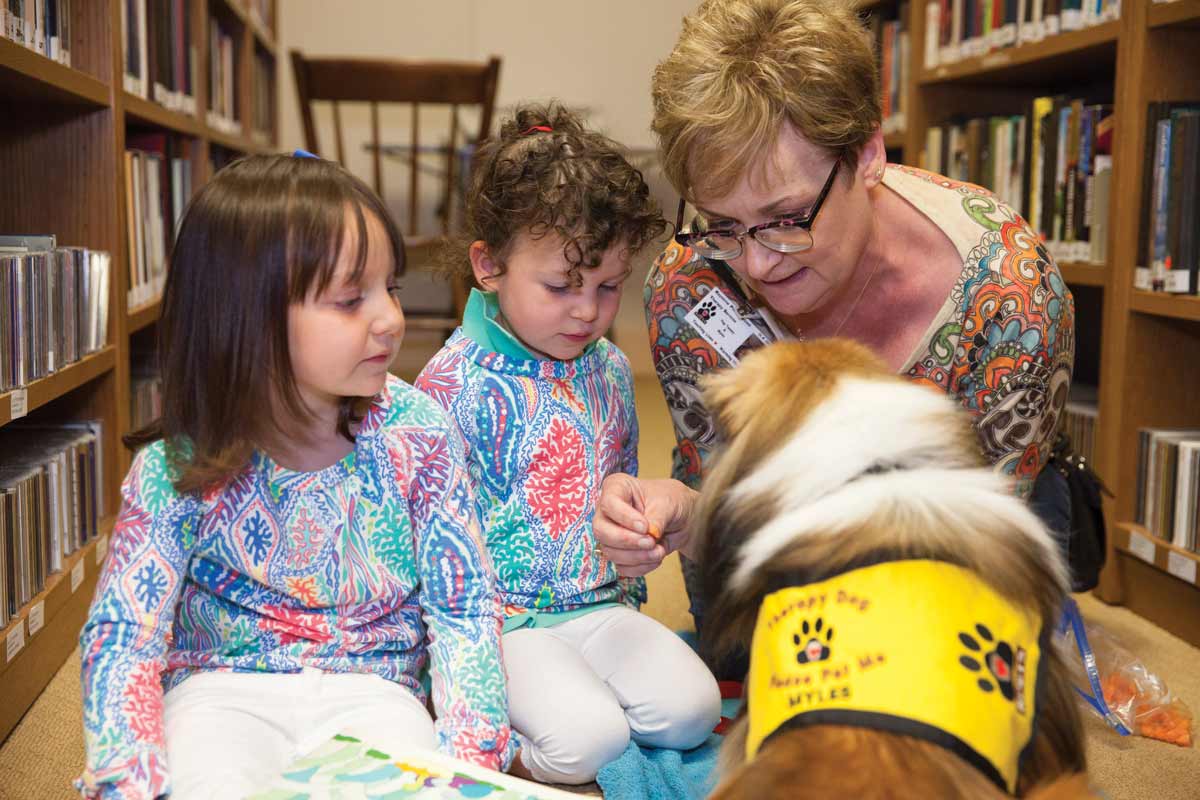
Dogs are especially helpful in schools and libraries, where they assist children in perfecting their reading skills. Karen notes that some dogs just love to be read to and provide children with the confidence to read aloud.
The dogs also have made an impact at Lancaster Behavioral Health Hospital. “Dogs can bring out things in a patient that a therapist can’t,” Karen notes of the courage they provide for delving into unspoken memories. Indeed, therapists and counselors in private practice nationwide have begun to introduce canine therapy to their own patients, which has met with success and resulted in stellar patient reviews.
Karen also marvels at the power dogs wield in physical-therapy settings. “They can actually motivate patients to do their therapy without them even realizing it,” she says of having patients brush a dog, walk it or throw it a ball. “Before they know it, it’s time for the session to end!”
The fact that dogs are nonjudgmental, makes them valuable members of a team where speech therapy is concerned. “And, they’ve helped so many children perfect their reading skills,” Karen reports. “We have a pitbull that just loves to be read to!”
KPETS has also joined the trend of going on college campuses during exam time to help students relax and de-stress. “The students just love it – some students from F&M thanked us with an incredible video they put together and shared on social media.”
Loving on Lititz
One of KPETS’ most challenging cases involved a contingent of volunteers traveling to Lititz in the aftermath of the horrific car crash that occurred on the edge of Warwick High School’s campus in late October 2018. The crash claimed the lives of two students and injured another. “We just wanted to be there for the students and staff,” says Karen. “We had 14 teams in Lititz for two weeks. We also went back to provide assistance following another tragic student loss.”
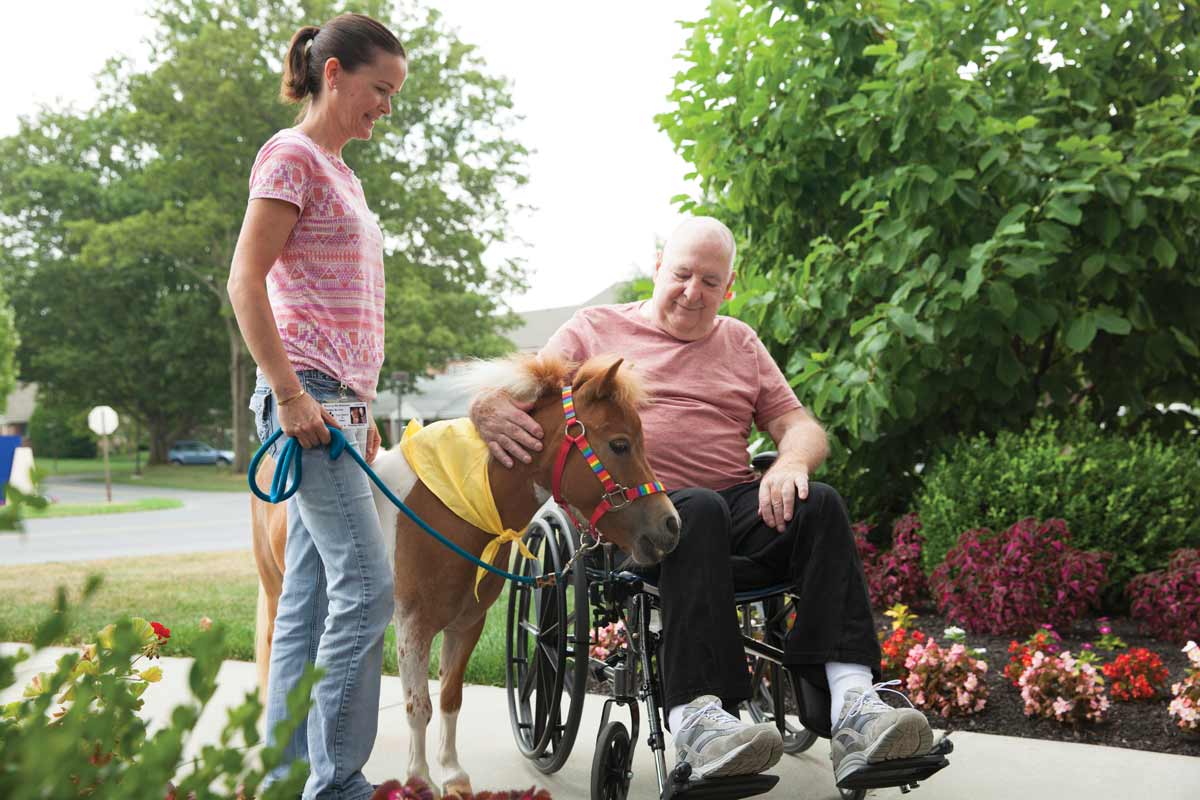
Mini-horses have become welcomed visitors at local retirement communities. KPETS has 10 mini-horses on its volunteer roster.
It had long been a goal of Warwick’s superintendent, Dr. April Hershey, to introduce a facility dog program to the district. The presence of the KPETS dogs helped to crystalize the benefits such a program could provide and the project was put into motion with the support of the Warwick Education Foundation, which launched a fundraiser to get it off the ground. The $30,000 goal was generously supported by area businesses and residents, enabling it to reach $41,383.
Thanks to the community’s support, the goal was made even more ambitious: providing every school building with its own facility dog. That goal has been achieved. Wendy Jordan of Dog Sense in Conestoga oversees the training of Warwick’s facility dogs.
The district also launched a school-wide initiative called Warwick Strong Day, the first of which was held on November 25, 2019. At the high school, the day began with a breakfast for first responders and continued with a lunch for volunteers, including the teams from KPETS. A food drive was also conducted. “That was such a nice event for our volunteers,” Karen says.
The 2020 event saw students gather supplies that were donated to the local pet pantry. “Our district has such a love for dogs,” says Public Relations Coordinator Jackie Yanchocik. “Students across all our buildings are always wanting to help and find ways to donate or give back to the facility dog program.”
Staying Pawsitive
Of course, the pandemic has put a halt to most of KPETS’ activities. “I know my dogs really miss it,” Karen says. “When they put their vests on, they know they’re going to work. Kody especially misses it. The other day, I took him to the bank with me and when we went inside, he was so excited to see people!”
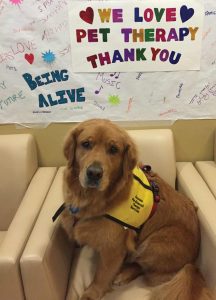
Prior to the pandemic, KPETS’ 450 teams averaged 10,000 visits per year to schools, hospitals, hospices, libraries, rehabilitation centers, retirement communities and juvenile detention facilities. Because of the pandemic, participation has declined. Karen is confident that once normalcy returns, so will volunteer participation.
Fundraising has also been impacted, although the $27,000 raised through the Extraordinary Give surpassed KPETS’ goal, for which Karen is very grateful, noting, “People in Lancaster County are so generous.” When Covid forced shutdowns and restricted attendance at social events, KPETS’ largest benefit, Tails of Comfort, which was scheduled to be held at the Lancaster Country Club in March, was postponed until fall. Due to ongoing restrictions, it pivoted to an online auction that will be taking place through February 1. “We have some amazing items!” Karen says.
Like most “dog people,” Karen has parlayed the love for her goldens into other ventures. She and Kody were certified as a team for National Crisis Response Canines. She started to dabble in social media through Facebook and Instagram (@Karenandthekids).
Karen, Bill and “the Kids” love to head to Dewey Beach, Delaware, for week-long vacations in the spring and fall. “I noticed they had events for greyhounds, doodles and chihuahuas on the beach every year in the off-season and thought, ‘Why not goldens?’” she explains. She made some phone calls and received a response from the mayor of Dewey Beach, saying she loved the idea and handed the reins of planning it over to Karen.
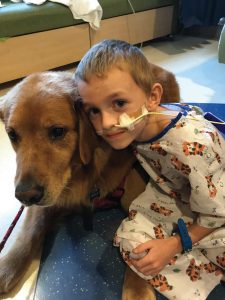
Children facing medical issues love the special brand of TLC that dogs provide. In this area, Penn State Health helped to pioneer pet therapy in a hospital setting 15 years ago, when it welcomed organizations such as KPETS to visit with patients at the Hershey Medical Center.
The event, called Dewey’s Golden Jubilee, launched seven years ago and has proved so successful that it is now held twice a year – the second weekend in May and the last weekend in September. The event has grown to include a parade of goldens through a part of town, contests, a Blessing of the Animals ceremony, all sorts of swag to buy and, of course, hundreds of goldens cavorting on the beach and in the surf. “In May 2019, we had something like 400 goldens running free on the beach,” she recalls. “It was something to see!” (Last year’s events were canceled due to Covid.)
The event also serves as a fundraiser for the Golden Retriever Lifetime Study, which is sponsored by the Colorado-based Morris Animal Foundation (morrisanimalfoundation.org) and was funded in part by the V Foundation for Cancer Research. Now in its ninth year, it is one of the largest and most comprehensive studies of its kind being conducted in the United States. Its aim is to identify the risk factors – nutritional, environmental, lifestyle and genetic – that contribute to cancer in dogs. The golden retriever provides the perfect case study, as 60% are impacted by the disease. Kody and Kylee are among the 3,000 goldens that are being screened throughout their lifetimes.
As for Karen and Bill, they’ve been using their Covid downtime to enjoy staying home at their six-acre farmette. “We have our dogs, goats and a horse. Life is good,” she says.
For more information, visit KPETS.org.
How Facility Dogs Help Educationally
According to the Warwick School District, the facility dogs are helping students in a myriad of ways, including:
- • Increasing communication skills
- • Fostering trust
- • Reducing anxiety
- • Easing stress
- • Reducing feelings of isolation
- • Reducing feelings of loneliness
- • Providing joy and affection
- • Improving self-esteem and feelings of self-worth
- • Improving socialization skills
- • Increasing attentiveness/engagement
- • Learning skills of acceptance and being nonjudgmental
- • Reducing inappropriate social behavior
Recognizing that not everyone is a “dog person,” Warwick has designated “dog-free” zones in the offices and other areas throughout its buildings. In addition, the district now has medical information cards that specify if a student has an allergy to animals/dogs, which is relayed to teachers.
Source: Warwick School District
Adopting a Dog
A curious thing happened as the pandemic made its presence known in the United States: people began adopting dogs and cats in record numbers. For the first time in their existence, many shelters found themselves in a precarious position – the strain wasn’t due to overcrowding but to a lack of four-legged residents available for adoption. Also, for the first time, people were embracing the concept of fostering animals in record numbers. According to Newsweek, in both Los Angeles and New York, two Covid hot spots, fostering has increased by 70% as compared to 2019. Shelters received so many applications and had so many success stories that some applicants were never given the opportunity to help.
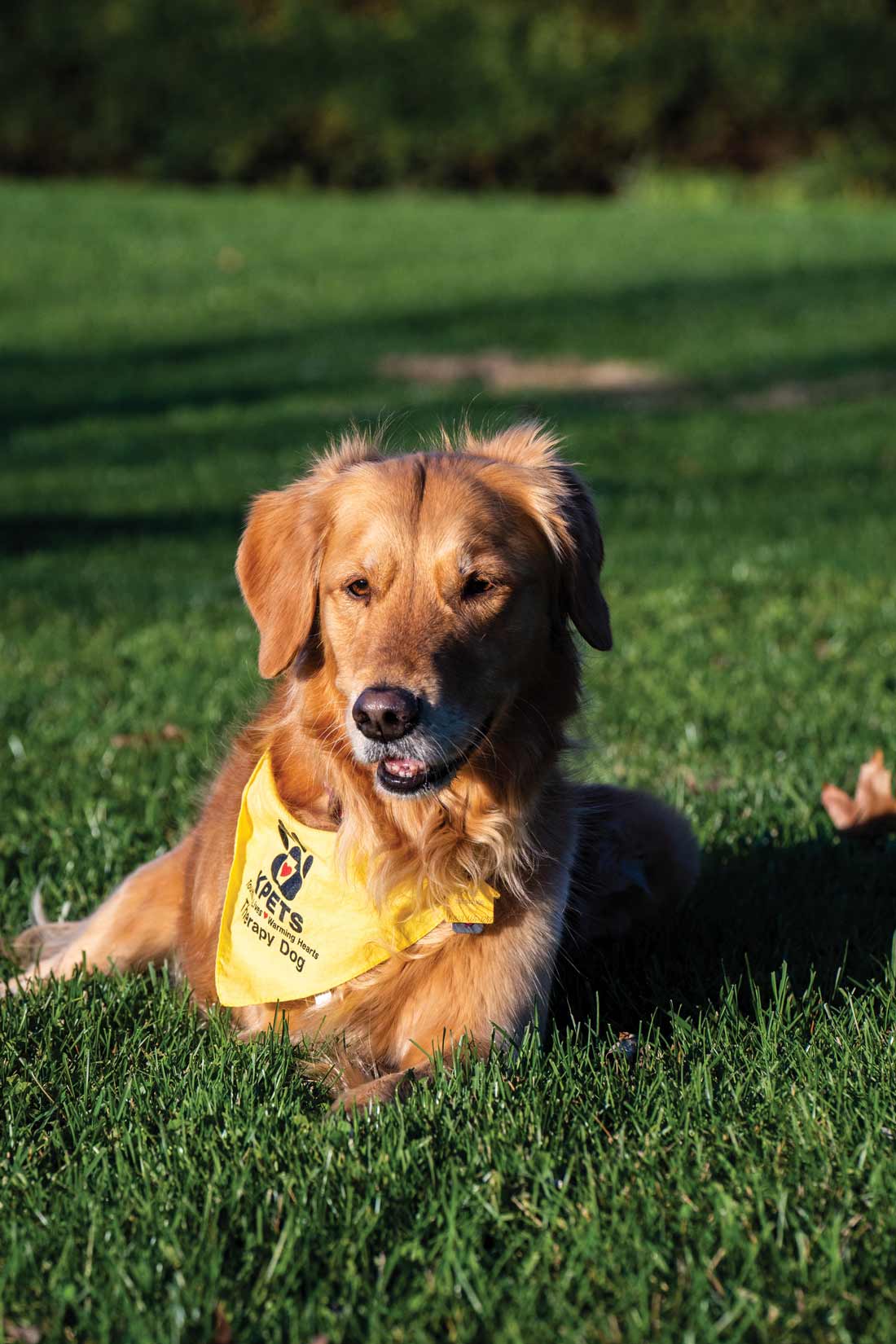
The Gerths adopted Kylee through the Delaware Valley Golden Retriever Rescue, which is based in Denver and is home to a unique facility called the Lynn Glennon Sanctuary, whose residents are senior-aged goldens and puppy mill survivors. The home-like facility prepares such dogs to make the transition to new homes. For more information, visit DVGRR.org.
While the adoption and fostering programs have met with unprecedented success, dog lovers like Karen Gerth worry what will happen once life returns to normal. “Yes, people have all the time for their pets now, but I worry what will happen once normalcy returns. I’d hate to see them end up back in shelters,” she says. Veterinarians and trainers are fearful a rise in separation anxiety and other disorders will occur once a dog’s human family members return to work and school on a consistent basis.
With a vaccine now in our grasp, Karen suggests that you should start taking the time to acclimate your pet to what your routine will look like once you return to the office and the kids are back in school full-time. “I have a friend who has begun the process by having her dog go to doggie day care once a week,” she explains of the familial-distancing ploy. Another option is to start leaving your home for stretches of time so that your pet becomes accustomed to having some alone time.
What if you’re late to the party and have now decided to adopt a dog? Petfinder.com urges you to consider the decision rationally and not impulsively. Things to consider include:
You: A pet is a long-term responsibility. You will be responsible for this animal for the next 10 to 15 years. Where do you see your life going over that time span? Will a dog fit into your long-term plans?
The Fit: Do your homework and research breeds that fit your lifestyle. If you’re a couch potato, a breed such as an Australian shepherd, a border collie or cattle dog would be miserable in your home. On the flip side, small breeds such as Yorkies and toy anythings probably wouldn’t be up for 10-mile hikes. If you’re adopting from a shelter, pay attention to the mix of breeds that make up the dog of your choice in order to gauge his or her activity level.
Allergies: Certain breeds are natural triggers for allergic reactions, while others are hypoallergenic. Do your homework.
Are You a Clean Freak: If you can’t deal with flying fur, accidents, drool and deconstructed toys, maybe you should re-think your plans to adopt.
Kids: Yes, the kids may be begging for a dog and promise to take charge of its daily needs but be realistic and know it’s an adult who will probably become the primary caretaker. Petfinder.com also suggests that you not bring a puppy into your home if babies and toddlers are part of the family dynamics.
Be Realistic: How much time will the dog be alone? How much time do you have for walks/exercise?
Travel: It’s not an issue now but once normalcy returns and you get back on the road for work or pleasure, will the dog travel with you or be boarded?
The Expense Factor: Pets are expensive! Their minimum requirements include regular veterinary care, food, treats, grooming, supplements, flea/tick treatments, collars/leashes, licensing and toys. Just as with kids, emergencies can and do pop up.

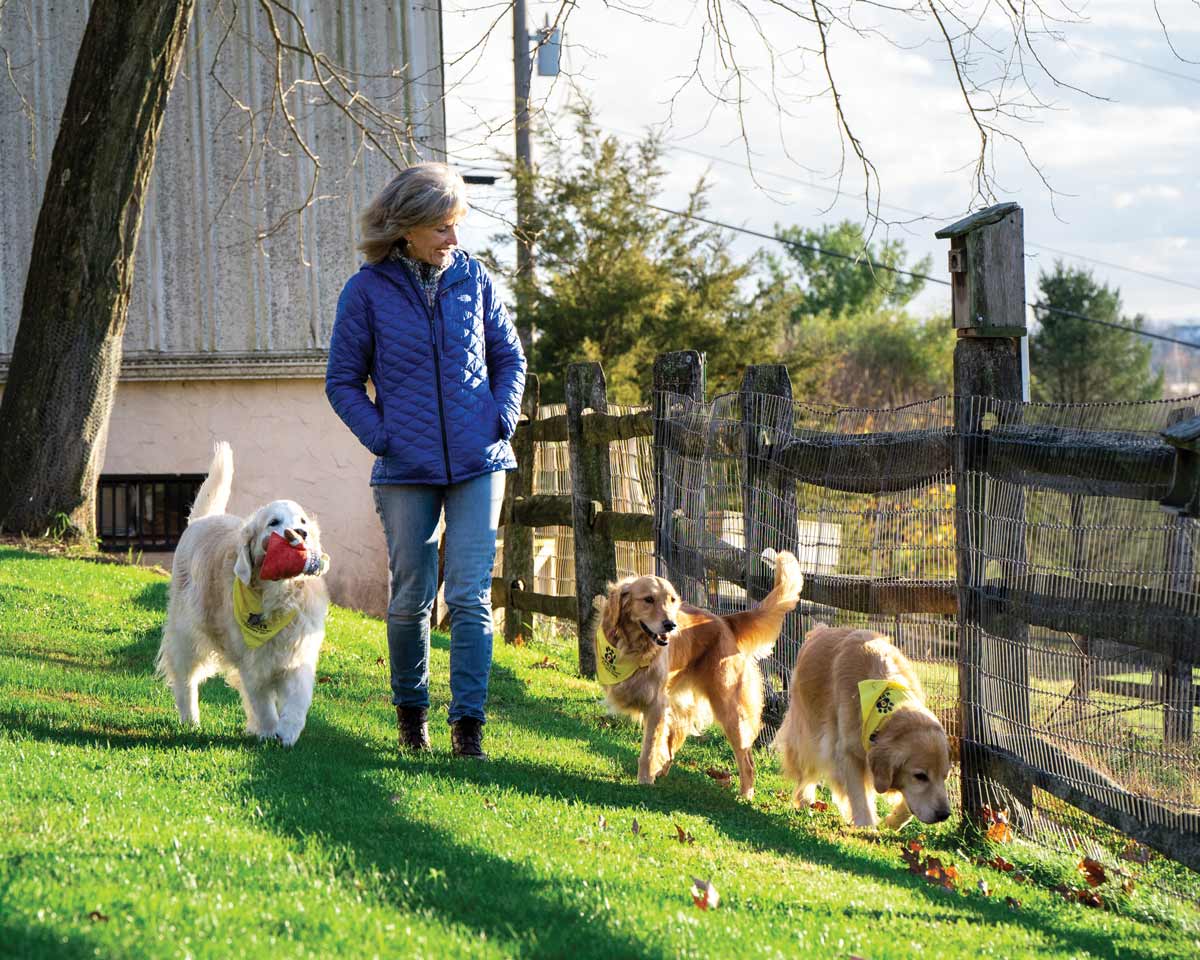

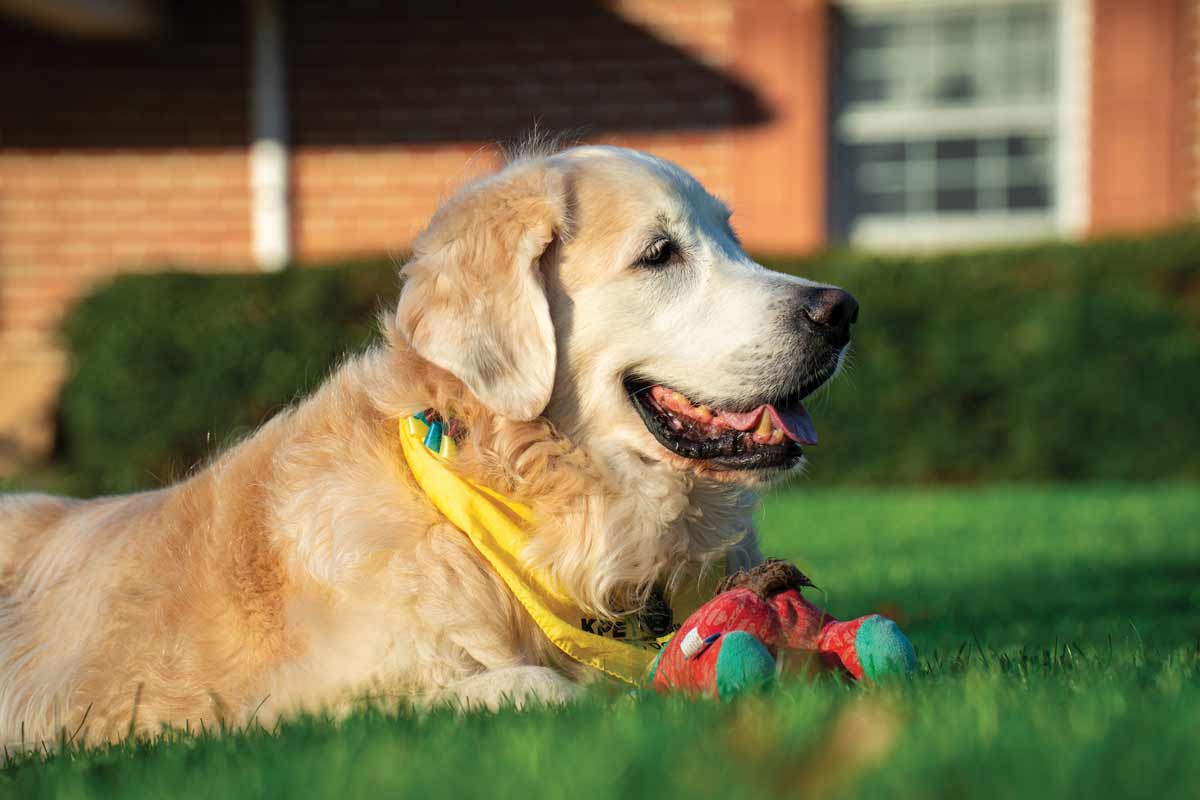
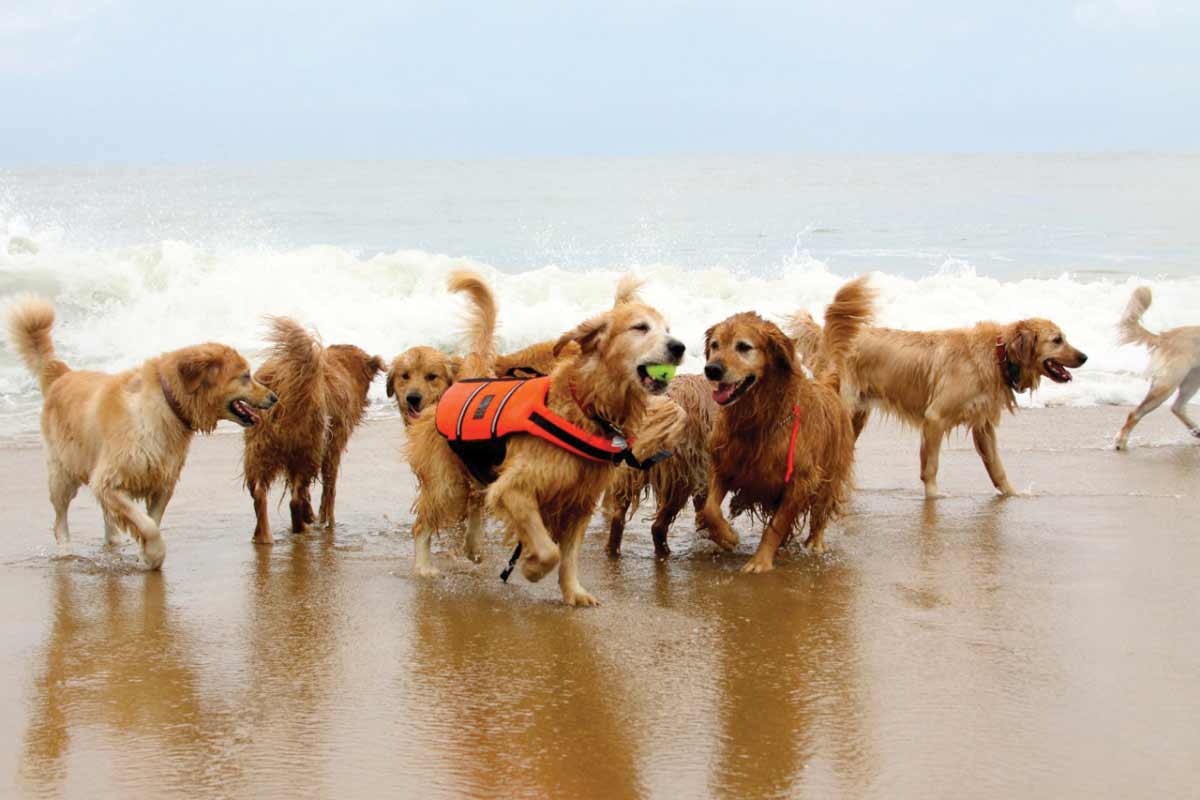

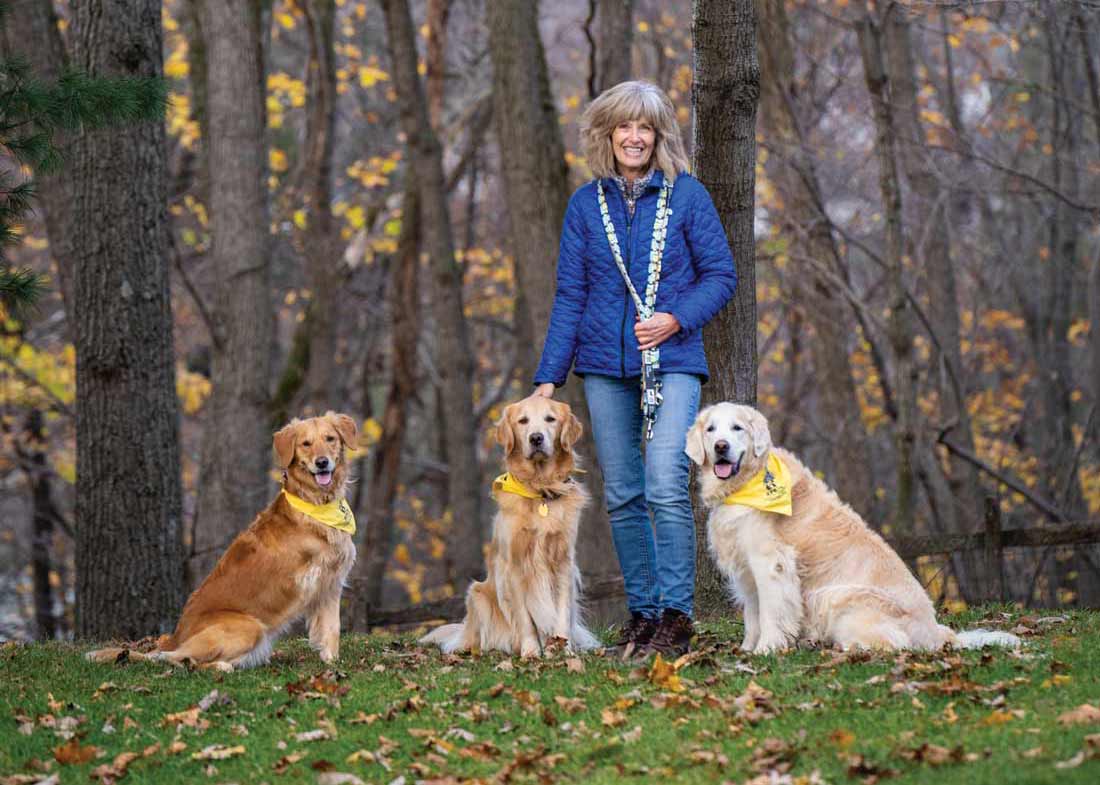
Leave a Reply